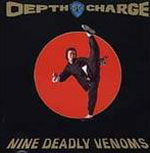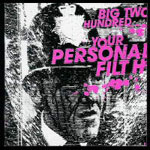
During those wilderness years the world changed. 23 Skidoo disappeared back in to an underground they helped to create. Hip hop sound collages? Yeah, they’d done all that. Skateboarding? Yup, Alex Turnbull had been British skateboard champion in ’76. Martial arts movies? Indeed that whole culture had been a huge influence on 23 Skidoo and comrades like Cabaret Voltaire, and snatches of dialogue from films had been appropriated.
Along the way 23 Skidoo evolved into Ronin (making explicit the Japanese samurai connection with ronin being displaced warriors), which also became a label, providing an outlet for homegrown hip hop talents, such as turntablist Deckwrecka, and the great Skitz, whose Ronin set Countryman is the great UK hip hop set, if only for the 'Domestic Science' cut featuring the voices of Estelle, Wildflower, and Tempa. Skitz and the desirability of underground 12”s was in turn immortalised in a Saturday Morning Rush skit by Earl Zinger.
As 23 Skidoo slid into the underground, so new talent surfaced. In Bristol the Wild Bunch and Three Stripe collectives evolved into Massive Attack and Smith and Mighty. In London Tim Simenon’s Bomb The Bass and Renegade Soundwave provided a nursery for the new generation of beat alchemists like J Saul Kane. Kane is known to have grown up on a diet of Lee Perry, Augustus Pablo, comics and martial arts movies, moving on through hip hop and electro, becoming a DJ, and reacting against the tyranny of the house beat by putting together his own tracks that caught the abstract hip hop feel of cuts like De La Soul’s 'Plug Tunin’' that had turned his world around.

The man behind Depth Charge, J Saul Kane, soon showed himself to be one of the more interesting pop figures of the era, by stubbornly refusing to capitalise on the success of Nine Deadly Venoms. It would be another four years before another Depth Charge set was released and then, to be awkward, two were released within a week. One of the two Lust sets featured an adaptation of Serge Gainsbourg’s 'Harley Davidson', perhaps pertinently linking the two men. And if at times their taste may be dubious (like also Barry Gifford or David Goodis books, or miami bass or dancehall) then they might just argue they’re reflecting society back at us, and that they may just find beauty in the most unlikely of places. Interestingly the press had more trouble with the fact that the real J Saul Kane actually is a somewhat reclusive clean living character, happy to stay at home watching football or kung fu films.
In the same way as Lee Perry or Kool Keith, J Saul Kane chooses to adopt a series of different personas that are all part of the same whole. Launched a week after the Depth Charge character was his Octagon Man guise that dwells more on the experimental electro side, and in this role he has released a series of exceptional records. And then, on the twisted abstract hip hop side, there’s the Alexanders Dark Band alter ego, which has provided a few sets that pretty much leave everything else standing, even Company Flow, Cannibal Ox, and the Anti Pop Consortium, which is as about as dark and disturbing and as abstract as you can get. There was a quote some years ago, “abstract is a word for sensations so new they haven’t got a name yet”, from a series of publications put out by the Cybernetic Culture Research Unit, at Warwick University, oddly enough.

My personal favourite DC Recordings release to date is Your Personal Filth by Big Two Hundred, which explicitly makes the connection to those early-‘80s pan-rhythmic pioneers like 23 Skidoo, Cabaret Voltaire and A Certain Ratio. It’s a fantastic messed-up record, and it’s the work of Andy Meecham and Dean Meredith, of the Chicken Lips mutant disco collective that is much loved by connoisseurs of the beat. Andy Meecham would also moonlight on DC as The Emperor Machine, seemingly tracking the electronica roots back to the Rah Band, Space, Peppers, Harry Thumann, krautrock and European disco sounds.
So, J Saul Kane is strangely the sort of character that poses a genuine threat to the music business in his insouciance and general unconcernedness. It’s sort of, yeah, every once in a while I’ll rouse myself, make a classic record, that overshadows all the toilers and plodders, and I’ll do little to promote it, stay underground, doing my own thing, getting by, enjoying myself.
© 2006 John Carney